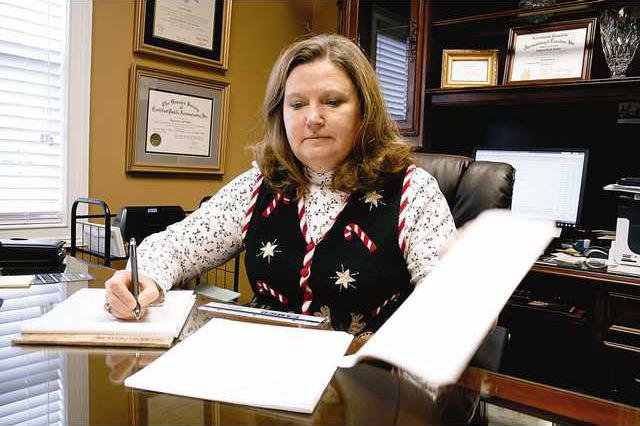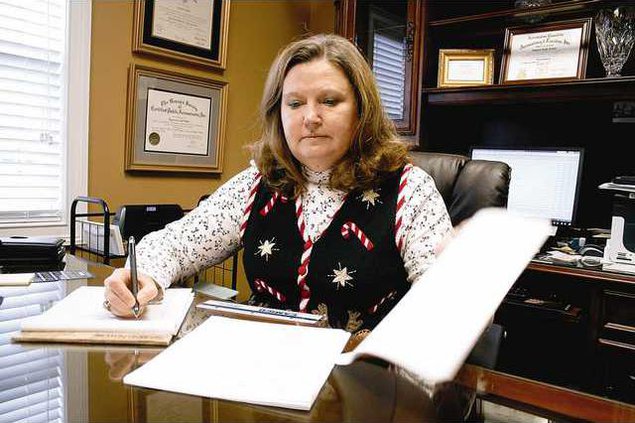Shifting investments, planning purchases, finding ways to save on taxes.
No matter how people plan to get their finances in order, many financial industry professionals in the Forsyth County area encourage them to start before the new year.
“There’s no telling what can happen in the next coming years with respect to tax brackets,” said Chris Smith, shareholder with CB Smith & Associates.
For those in a position to do so, now is the perfect time to take advantage of some of the tax credits available.
Among the many incentives offered at the federal level, there are two home purchase credits and two energy-saving improvement credits.
For those who qualify, the credits can be applied to 2009 tax returns, if purchased by Dec. 31.
Local accountant Eugenia Foster said people sometimes make the mistake of thinking they’ll have time after the new year.
“But you have to make the donation before Dec. 31,” she said. “You have to buy that car before Dec. 31.
“I would never be an advocate for buying a car if you don’t need it. But if you are in need of a car, this year is a good year because you can write off the sales tax on it.”
For those without an organizational system, Foster suggests using one of the various computer programs on the market to help keep track of finances.
But even for those who prefer hard copies, it’s important to “know where your money is at, how you are invested and how your investments are doing.”
It’s been an unusual year for investors, said Roy Larsen of Larsen Wealth Management. Typically at year’s end, investors try to balance their gains and look for some losses.
“But there’s not a whole lot of that this year,” he said. “People in the last year or two have had so much in losses, a lot of folks have built up a fairly significant war chest of bankable losses that they’ll probably be able to use for years in advance.”
This year, Larsen said the end of the year is going to be mostly dedicated to looking toward 2010.
Among the possibilities for investors in January is the ability for those making more than $100,000 to convert from a traditional IRA, or individual retirement account, to a Roth IRA.
Larsen said the firm is spending most of December talking about such options with clients.
With general investments, he said, recommendations are “just more emblematic of where we are at in the economic recovery and not necessarily contingent on the calendar year.”
For those with few investments, or anyone just looking to get more out of this year’s return, Smith said there are some small tips to help.
“If this is a year in which they are [expecting] a little bit of income, they may want to consider delaying that income,” he said. “If they’re getting a bonus at the end of the year, consider speaking to an employer about receiving that bonus in January rather than December to ... reduce the tax burden for this year.”
Homeowners can pay January’s mortgage a few days early to get the interest deduction in December, Smith said.
For those with heavy medical expenses, Smith said to get that extra pair of glasses or stock up on prescription drugs before the year’s out, because “the way medical expenses are, your deduction doesn’t come into play until it reaches at least 7.5 percent of your income.”
“You need to push more into this year to get a deduction out of it,” he said.
Regardless of salaries, investments or assets, Smith said clients are “finding ways not only to save money, but also reduce their debt burden that they have out there.”
“Wherever they can save money, they’re looking to do it,” he said.
No matter how people plan to get their finances in order, many financial industry professionals in the Forsyth County area encourage them to start before the new year.
“There’s no telling what can happen in the next coming years with respect to tax brackets,” said Chris Smith, shareholder with CB Smith & Associates.
For those in a position to do so, now is the perfect time to take advantage of some of the tax credits available.
Among the many incentives offered at the federal level, there are two home purchase credits and two energy-saving improvement credits.
For those who qualify, the credits can be applied to 2009 tax returns, if purchased by Dec. 31.
Local accountant Eugenia Foster said people sometimes make the mistake of thinking they’ll have time after the new year.
“But you have to make the donation before Dec. 31,” she said. “You have to buy that car before Dec. 31.
“I would never be an advocate for buying a car if you don’t need it. But if you are in need of a car, this year is a good year because you can write off the sales tax on it.”
For those without an organizational system, Foster suggests using one of the various computer programs on the market to help keep track of finances.
But even for those who prefer hard copies, it’s important to “know where your money is at, how you are invested and how your investments are doing.”
It’s been an unusual year for investors, said Roy Larsen of Larsen Wealth Management. Typically at year’s end, investors try to balance their gains and look for some losses.
“But there’s not a whole lot of that this year,” he said. “People in the last year or two have had so much in losses, a lot of folks have built up a fairly significant war chest of bankable losses that they’ll probably be able to use for years in advance.”
This year, Larsen said the end of the year is going to be mostly dedicated to looking toward 2010.
Among the possibilities for investors in January is the ability for those making more than $100,000 to convert from a traditional IRA, or individual retirement account, to a Roth IRA.
Larsen said the firm is spending most of December talking about such options with clients.
With general investments, he said, recommendations are “just more emblematic of where we are at in the economic recovery and not necessarily contingent on the calendar year.”
For those with few investments, or anyone just looking to get more out of this year’s return, Smith said there are some small tips to help.
“If this is a year in which they are [expecting] a little bit of income, they may want to consider delaying that income,” he said. “If they’re getting a bonus at the end of the year, consider speaking to an employer about receiving that bonus in January rather than December to ... reduce the tax burden for this year.”
Homeowners can pay January’s mortgage a few days early to get the interest deduction in December, Smith said.
For those with heavy medical expenses, Smith said to get that extra pair of glasses or stock up on prescription drugs before the year’s out, because “the way medical expenses are, your deduction doesn’t come into play until it reaches at least 7.5 percent of your income.”
“You need to push more into this year to get a deduction out of it,” he said.
Regardless of salaries, investments or assets, Smith said clients are “finding ways not only to save money, but also reduce their debt burden that they have out there.”
“Wherever they can save money, they’re looking to do it,” he said.

